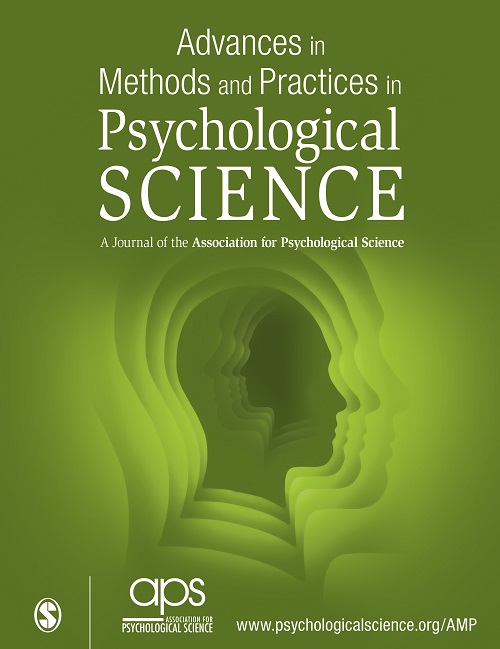Precise Answers to Vague Questions: Issues With Interactions
IF 15.6
1区 心理学
Q1 PSYCHOLOGY
Advances in Methods and Practices in Psychological Science
Pub Date : 2020-12-04
DOI:10.1177/25152459211007368
引用次数: 22
Abstract
Psychological theories often invoke interactions but remain vague regarding the details. As a consequence, researchers may not know how to properly test them and may potentially run analyses that reliably return the wrong answer to their research question. We discuss three major issues regarding the prediction and interpretation of interactions. First, interactions can be removable in the sense that they appear or disappear depending on scaling decisions, with consequences for a variety of situations (e.g., binary or categorical outcomes, bounded scales with floor and ceiling effects). Second, interactions may be conceptualized as changes in slope or changes in correlations, and because these two phenomena do not necessarily coincide, researchers might draw wrong conclusions. Third, interactions may or may not be causally identified, and this determines which interpretations are valid. Researchers who remain unaware of these distinctions might accidentally analyze their data in a manner that returns the technically correct answer to the wrong question. We illustrate all issues with examples from psychology and issue recommendations for how to best address them in a productive manner.对模糊问题的精确回答:互动问题
心理学理论经常援引互动,但对细节仍含糊其辞。因此,研究人员可能不知道如何正确地测试它们,并且可能会进行可靠地返回错误答案的分析。我们讨论了关于相互作用的预测和解释的三个主要问题。首先,互动可以是可移除的,因为它们的出现或消失取决于规模决策,并对各种情况产生后果(例如,二元或分类结果,具有下限和上限效应的有界规模)。其次,相互作用可能被概念化为斜率的变化或相关性的变化,因为这两种现象不一定一致,研究人员可能会得出错误的结论。第三,互动可能是也可能不是因果识别的,这决定了哪些解释是有效的。没有意识到这些区别的研究人员可能会意外地分析他们的数据,从而为错误的问题返回技术上正确的答案。我们用心理学的例子来说明所有问题,并就如何以富有成效的方式最好地解决这些问题提出建议。
本文章由计算机程序翻译,如有差异,请以英文原文为准。
求助全文
约1分钟内获得全文
求助全文
来源期刊
CiteScore
21.20
自引率
0.70%
发文量
16
期刊介绍:
In 2021, Advances in Methods and Practices in Psychological Science will undergo a transition to become an open access journal. This journal focuses on publishing innovative developments in research methods, practices, and conduct within the field of psychological science. It embraces a wide range of areas and topics and encourages the integration of methodological and analytical questions.
The aim of AMPPS is to bring the latest methodological advances to researchers from various disciplines, even those who are not methodological experts. Therefore, the journal seeks submissions that are accessible to readers with different research interests and that represent the diverse research trends within the field of psychological science.
The types of content that AMPPS welcomes include articles that communicate advancements in methods, practices, and metascience, as well as empirical scientific best practices. Additionally, tutorials, commentaries, and simulation studies on new techniques and research tools are encouraged. The journal also aims to publish papers that bring advances from specialized subfields to a broader audience. Lastly, AMPPS accepts Registered Replication Reports, which focus on replicating important findings from previously published studies.
Overall, the transition of Advances in Methods and Practices in Psychological Science to an open access journal aims to increase accessibility and promote the dissemination of new developments in research methods and practices within the field of psychological science.

 求助内容:
求助内容: 应助结果提醒方式:
应助结果提醒方式:


